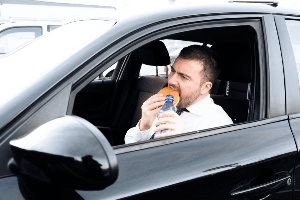 Drivers should operate their vehicles safely to avoid an accident. This includes avoiding distracted driving. Most people only think about cell phones as a form of distraction. But there are other behaviors that take a driver’s attention away from the road. For example, eating while driving.
Drivers should operate their vehicles safely to avoid an accident. This includes avoiding distracted driving. Most people only think about cell phones as a form of distraction. But there are other behaviors that take a driver’s attention away from the road. For example, eating while driving.
If a driver who was eating and driving crashes into your vehicle, he or she may be liable for your damages. Let our vehicle collision lawyers in Fort Worth review your claim. The consultation to discuss your legal options is free. There are also no upfront fees for our services.
Below, we discuss the dangers of eating while driving, including how the law determines liability if a crash occurs.
Why Eating and Driving is Distracting
Eating behind the wheel increases the chances of causing a crash by 80 percent. This is according to the National Highway Traffic and Safety Administration (NHTSA). The same factors that make texting and driving dangerous also make eating and driving unsafe. These factors include:
- Cognitive distractions – a driver’s mental focus is on eating or avoiding dropping food and not on the road.
- Manual distractions – holding or unwrapping food prevents a driver from keeping both hands on the wheel.
- Visual distractions – looking down at food means a driver is not looking at the road.
Even one of these distractions on its own is dangerous. When combined with other inattentive behaviors, they can be lethal.
Drivers who are not watching the road may:
- Fail to yield
- Run a stop sign
- Run a red light
- Fail to see a pedestrian
- Fail to see stopped vehicles
- And more
Drivers Should Keep Both Hands on the Wheel
Proper steering is difficult with only one hand, especially during an emergency. For example, drivers may unexpectedly be forced to swerve to avoid a collision. Without both hands on the wheel, the driver may lose control of the vehicle and be unable to avoid crashing.
Is Eating While Driving Illegal in Texas?
Eating while driving is not illegal in Texas. There is currently no specific statute that outlaws it.
Drivers cannot get pulled over for eating behind the wheel. They can get ticketed for distracted driving, though.
Due to the distracting nature of eating and driving, it is considered a negligent action. This means a driver distracted by food who causes a crash may be liable for damages.
How is Liability Determined?
Liability for a collision comes down to negligence. As the injury victim, you must prove:
- You were owed a duty of care
- There was a breach of that duty
- The breach of duty directly resulted in your damages
All drivers owe a duty of care to others who share the road. That duty includes avoiding any distractions that may lead to a crash. This means drivers should wait to reach their destination before chowing down.
If you can prove the at-fault driver was eating when the crash happened, you may also be able to establish negligence.
What Evidence Can Help Prove a Driver Was Eating?
Proving someone was eating before he or she caused a crash is often difficult. Especially if there was a passenger in the vehicle. The passenger may try to claim he or she was eating and not the driver.
However, there is some evidence you may be able to present to prove your claim. This includes:
- Eyewitness statements – Anyone who saw the collision or events that led up to it may have seen the driver eating and swerving.
- Police report – The police perform a preliminary investigation to determine the cause of a crash. Any evidence of food in the car may help prove the driver was eating at the time of the collision, especially if the driver was the sole occupant. If the responding officer documents this information in the police report, it may help provide additional evidence for your claim.
- Photographs – If possible, you may be able to use pictures from inside the at-fault driver’s vehicle showing any signs of food.
- Bank records – This evidence may only be available if your case gets to the discovery phase. Although not definitive proof on its own, the at-fault driver’s bank records might reveal a fast food stop before the accident.
You do not need to prove someone broke the law or was reckless to hold them liable for your damages.
Let Us Handle Your Claim. Call Today
Eating behind the wheel is a form of distracted driving and is therefore considered negligence. If you were injured by a driver who was distracted by food, you may be eligible to pursue compensation.
Our attorneys are prepared to investigate your claim and discuss your legal options. The legal consultation is free, and there are no upfront fees. There is no risk to speak to an attorney.
Call (817) 920-9000 to schedule your free consultation.
